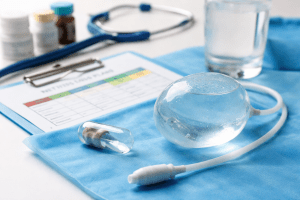Chest Physiotherapy involves a couple of physical techniques that help remove secretion from the lungs. It helps in the better functioning of the lungs and makes the lungs stronger. CPT helps strengthen lung muscles and expand lungs by removing congestion from the lungs through the respiratory system.
- Atelectasis: It is a condition in which most of the lung tissues are damaged. It results in difficulty in breathing, coughing and shallow breathing.
- Cystic Fibrosis: It is a genetic disorder in which a thick mucus-like layer is formed within the lungs, resulting in a respiratory problem.
- Bronchiectasis: It is a condition where the lungs’ bronchial tubes suffer serious damage along with deposition of mucus and bacterial infection leading to respiratory issues.
- Immobility: In most cases, it results in the patient being bed-ridden and being bed-ridden for long-term results to risks like pneumonia and other breathing problems due to lack of physical exercise.
Types of chest Therapy:
- Chest percussion: It is a method in which palms are folded in the form of cups and used to strike on the chest, underarms, and back. It helps in breaking up secretions in the lungs, making them easier to extract. The method is applied for two minutes on each side of the body. But a condition applies the patient should be comfortable and in a painless position during percussion.
- Vibration: In this method, the patient’s chest is contracted and released using hands. This contraction and expansion help in mucus break up from the patient’s lungs. Sometimes the patient wears a special CPT vest that is hooked up to a machine. The machine makes the vest vibrate in high frequency leading to a breakdown of secretion from the patient’s body.
- Incentive spirometry: In this method, a special device is used to inhale strongly and re-expand the lung’s capacity and strengthen the lung’s muscles. The method is used mostly after lung surgery to strengthen the lungs.
- Controlled coughing Techniques: The patient needs to sit upright in a bed and breathe deeply through the nose and later exhale the cough through the mouth. The cough comes out in the form of mucus and germs.
- Positioning and turning from side to side: In case the patient is bed-ridden, the process helps in lung expansion and drainage of secretion.
Contraindications
Contraindications to chest physiotherapy all are associated and include the following:
- Discomfort due to physical positions or manipulations
- Bleeding diathesis (including therapeutic anticoagulation)
- Elevated intracranial pressure
- Rib fractures
- Recent hemoptysis
- Vertebral fractures or osteoporosis
Benefits of chest physiotherapy
Chest physiotherapy has a number of benefits. In addition to assisting you breathe more easily, it can also stop chest infections and decrease bouts of coughing. Even if your objective is to use these techniques at home, having a skilled physiotherapist walk you through the steps and any essential equipment can offer you greater safety and confidence.
Read More: The Role of Physical Therapy in Battling Covid-19
When to stay away from chest physiotherapy
Chest physiotherapy is not suggested if you:
- Are taking anticoagulation drugs.
- Have severe discomfort in the required positions or manipulations.
- Have had a recent vertebral or rib fracture.
- Have rigorous osteoporosis.
Who prescribes or performs chest physiotherapy?
A registered nurse or respiratory therapist performs chest physiotherapy. Respiratory therapists are healthcare professionals who treat, assess, and care for patients with breathing issues. Based on your condition, the nurse or respiratory therapist may also teach you and your family to carry out the techniques at home.
The following specialists often recommend chest physiotherapy:
- Pulmonologists are pediatricians or internists with specialized training in treating conditions and diseases of the chest, such as asthma, pneumonia, tuberculosis, emphysema, or complex chest infections.
- Hospitalists focus in caring for hospitalized patients. Hospitalists are typically doctors, but can also be a nurse practitioner (NP) or physician assistant (PA).
- Primary care providers including family practitioners, internists, geriatricians, pediatricians, PAs, and nurse practitioners (NPs). Primary care providers provide wide-ranging healthcare services and treat a vast range of conditions and illnesses.
How is chest physiotherapy performed?
Your chest physiotherapy will be performed in a clinic, long-term care facility, hospital, or in your home. It is typically done several times a day. Techniques differ depending on diagnosis, age, and general health. Some chest PT techniques necessitate you to sit up. Others permit you to lie on your back, side or stomach based on the area of the lungs that need drainage. In a few cases, your head will be lower than the chest. Gravity will support drainage.
Nebulizer breathing treatments are often helpful to open the airways or thin, moisten, or break up mucus. If your physician recommends this, you will breathe in a mist containing saline solution or medications prior to your chest physiotherapy session.
Your relaxation and comfort is important to you and your respiratory therapist team. Chest physiotherapy methods can be uncomfortable and tiring, particularly for chronically ill or weak patients. Tell your provider if you are fatigued or uncomfortable. Your provider will adjust the method to your condition. Your acceptance for chest physiotherapy must improve over time, as you feel better.
The risks and potential complications of chest physiotherapy
Chest physiotherapy is usually safe for most patients when techniques are suitable for the patient’s condition. In some cases, such as when the head is lowered, chest physiotherapy can cause the below mentioned complications:
- Cardiac arrhythmia (abnormal heartbeats)
- Bleeding in the lungs and coughing up blood
- Increased pressure within the head
- Low blood pressure
- Inhaling secretions into the lungs
- Low levels of oxygen in the blood
- Vomiting
- Rib or spine pain or injury
You can minimize certain complications or decrease the risk by telling your provider about any symptoms. Symptoms such as headache, pain, fatigue, dizziness, shortness of breath or nausea must be reported to the physician immediately. It is also significant to follow your treatment plan, such as performing breathing treatments and taking medications as recommended.
How to prepare for chest physiotherapy?
The steps you take before chest physiotherapy can improve your comfort and result. Refrain from eating anything before chest PT. Some techniques necessitate you to drink a glass of water prior to the treatment to help loosen and thin thick lungs secretions. Your nurse, doctor, or respiratory therapist might give you other instructions to follow prior to chest PT.
Questions to ask
It is common for patients to disregard some of their questions about their treatments and disease during a doctor’s visit. You can also think of other questions after your appointment or after you leave the hospital. Get in touch with your doctor with concerns and questions before chest physiotherapy and between appointments.
It is a better to ask a few questions to your appointments. Common questions are:
- Why chest physiotherapy is required? Are there any other options for treating this condition?
- How often and how long will the chest physiotherapy is needed?
- How to take the medications?
- When to follow up with the doctor?
- How to get in touch with the doctor? Ask for numbers to call during and after regular hours.
What to expect after chest physiotherapy?
Chest PT is complex work and can be exhausting, but you will tolerate therapy better as your condition betters. Tell your provider if you are not comfortable or tired so the techniques can be changed a bit. In due course, chest physiotherapy can assist you breathe easier, enhance the amount of oxygen in your blood, and enhance your energy level.
Conclusion
As per a recent research it has been found that chest physiotherapy has positive effects on patients and improves the overall quality of life and health of these individuals. It is essential to understand that chest physical therapy is not just one particular treatment, but rather a group of treatments that help patients reach their goal collectively. A patient may go through one technique or numerous techniques based on what is projected to offer them the best outcome. In maximum cases, chest physiotherapy is used in combination with traditional treatments such as corticosteroids. Chest physiotherapy is a great way to help in the management of breathing disorders or other pulmonary disorders.







